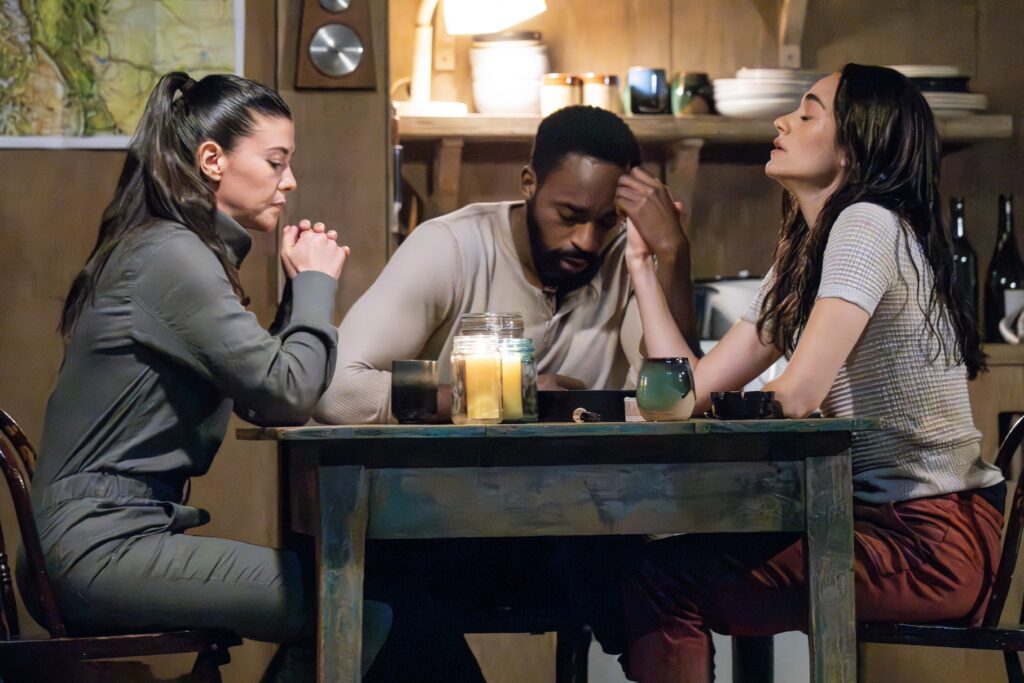With ‘Walden,’ Playwright Amy Berryman Pushes Ideals Embraced by Thoreau Into the Future and Out of This World
Some of the tensions that develop can seem a bit contrived, as if Berryman is underlining parallels between existential dilemmas and conflicts within relationships, but the writing is clever and compassionate.

The script for Amy Berryman’s “Walden” lists the play’s setting as the “American wilderness” in “the not-too-distant future.” For the New York premiere, scenic designer Matt Saunders has furnished a handsome cabin with corrugated metal. Adorned with evergreens and with a solar-paneled roof, it could be a cozy vacation home for an environmentally conscious urbanite — except its residents aren’t vacationing, and their environmental consciousness has been piqued by events even more staggering than the flood of natural disasters that have made headlines in recent years.
Just moments into the production, Stella, a former NASA scientist played by an alumnus of the popular TV series “Shameless,” Emmy Rossum, is listening to a news report about a tsunami of plainly epic proportions. “The number of missing persons presumed dead has grown to almost one million,” the reporter announces, “as the number of those seeking Climate Refugee status continues to climb.”
Stella and her housemate and fiancé, Bryan, are awaiting the arrival of her twin sister, Cassie, an astronaut who has just returned from the moon — one of a few extraterrestrial destinations where, apparently, the government is looking into real estate prospects as our own planet becomes increasingly uninhabitable.
For Bryan, who belongs to a populist political movement called the Earth Advocates, the moral questions posed by Cassie’s latest mission are universal, in the most literal sense. “We aren’t against NASA, we’re just against colonizing,” he’ll explain to the woman poised to be his sister-in-law, in one of several charged but generally polite debates that unfold between them during this one-act piece. “We should be saving our own planet, instead of colonizing another one.”

In detailing this brand of populism, which Stella has also come to embrace, Ms. Berryman acknowledges the ironies informing our own, pre-apocalyptic political climate. Essentially, Bryan is a terrestrial isolationist who wants to make the Earth great again — though his pro-environment, anti-colonization stance marks him squarely as a progressive.
It’s fitting, in fact, that “Walden” should open on the heels of yet another polarizing, bitterly fought presidential election, as none of its characters could be described as enchanted with their government — or satisfied in their personal lives, for that matter. It is disclosed that Stella also aspired to be an astronaut, but for all her academic brilliance — before meeting Bryan, she was the chief architect for a mission designed for Mars — she failed a physical fitness test.
Cassie, in contrast, seems to have flourished in her job; more than once, she boasts of having managed to grow something in the ground during her moon mission — an unprecedented achievement that becomes even more meaningful when we learn of a recent and highly personal loss suffered by Stella.
Yet Cassie, too, has reasons for envying her sister. We sense this at first as she enjoys the familiar comforts of her home planet, like wine and fresh air — even if neither are readily available to most humans at this point — and it’s made increasingly obvious as she and Bryan, despite their differences, grow closer.
Some of the tensions that develop can seem a bit contrived, as if the playwright is underlining parallels between existential dilemmas and conflicts within relationships. But the writing is clever and compassionate, and director Whitney White crisply guides the actors, who in addition to Ms. Rossum include a “Succession” alumna, Zoë Winters, and, as Bryan, Motell Foster.
Playing twins who had believed that they were fraternal but discover they are identical, Mses. Rossum and Winters prove similar in appearance — both are dark-haired, slim, and attractive — but with physical differences that seem to reinforce certain character traits. Ms. Rossum is the more delicate beauty, and while her Stella hardly comes across as fragile, she has trouble freely expressing herself. “She doesn’t talk,” Bryan tells Cassie at one point. “I need to talk when I’m upset.”
So does Cassie, and Ms. Winters conveys a sturdy confidence that makes it credible how Bryan could be drawn to his partner’s sibling. Mr. Foster gives the most relaxed and easily charismatic performance of the three, though Bryan’s own sensitivity and his capacity for getting frazzled when frustrated are also made clear.
In case you’re wondering about the play’s title, Stella is, like her late father — who preceded Cassie in space voyages — a passionate Thoreau fan, who in fact named one of her missions after the naturalist author’s most famous work. In a lighter moment, the sisters impersonate their dad quoting from the book: “This whole earth which we inhabit is but a point in space.”
With “Walden,” Ms. Berryman has crafted a testament to both the vulnerability and resilience of the planet, and of its most obtrusive inhabitants.

